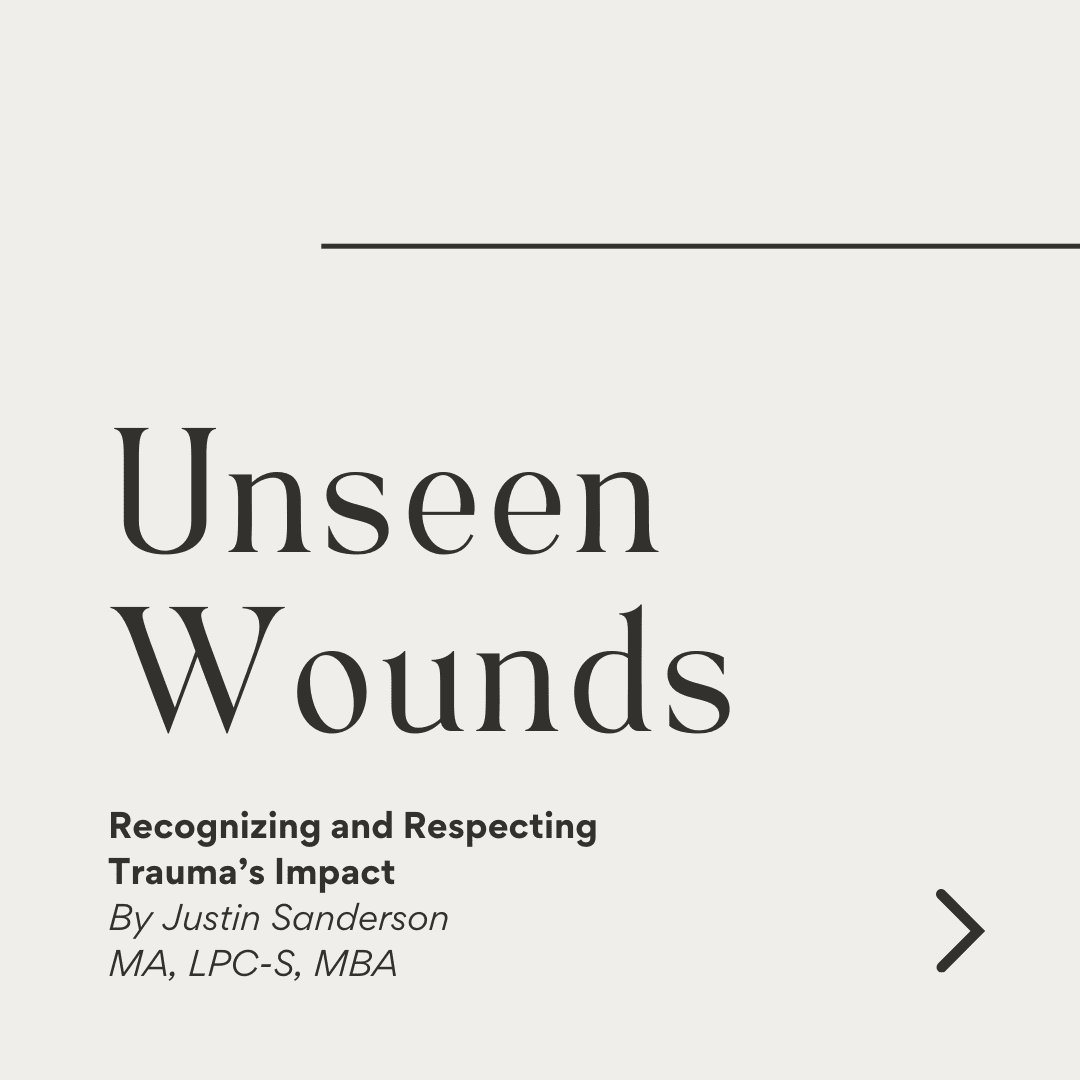By: Justin Sanderson MA, LPC-S, MBA
In the tapestry of human experience, trauma threads through many lives, weaving patterns of pain and resilience. It is a powerful force that does not discriminate, affecting people of all ages, backgrounds, and circumstances. Trauma can stem from a myriad of experiences, but it is not about the societal view of how extreme it is, it is about the impact it makes on us. Each of these experiences leaves a mark on our psyche, shaping our perceptions and interactions with the world.
Understanding the Diverse Faces of Trauma
Trauma is as diverse as the individuals who endure it. For one person, it might be the sudden loss of a job they were passionate about, plunging them into uncertainty and self-doubt. For another, it might be the enduring pain of a parent leaving them at a young age, a wound that reopens with every significant life event. Even witnessing a tragic accident or experiencing violence can leave deep scars that profoundly alter one’s sense of safety and trust.
Regardless of the experience, it is imperative to emphasize that no form of trauma should be trivialized. The assessment of trauma’s severity cannot be confined solely to the event itself but rather should encompass its profound impact on the individual. Hence, it is necessary for us to abstain from judgment or belittlement of others’ experiences. Instead, we ought to foster an ethos of empathy and support, cognizant that the grip of trauma manifests uniquely and deeply within each individual. It is equally critical to refrain from minimizing our own experiences of trauma. Engaging in self-compassion and acknowledging the profound impact of our personal trauma are crucial steps toward healing.
The Impact of Trauma on the Brain
Trauma does not merely affect our emotions; it alters the very structure and function of our brain. The amygdala, the brain’s fear center, becomes hyperactive, leading to heightened anxiety and vigilance. Meanwhile, the hippocampus, responsible for memory and learning, can shrink, impairing our ability to form new memories and recall past events. The prefrontal cortex, which governs decision-making and impulse control, may also weaken, making it challenging to regulate emotions and behaviors.
This neurological upheaval manifests in various ways, from flashbacks and nightmares to emotional numbness and difficulty concentrating. Understanding these effects underscores the importance of addressing trauma with the gravity it deserves.
Healing: A Journey of Acknowledgment and Acceptance
Healing from trauma is not about erasing painful memories but about learning to coexist with them. The first step is acknowledgment—recognizing the presence of trauma and its profound impact on our lives. We must be willing to face the dragon within us, accepting its existence rather than suppressing or denying it.
Therapeutic approaches such as cognitive-behavioral therapy (CBT), eye movement desensitization and reprocessing (EMDR), and mindfulness practices can be instrumental in this journey. These methods help individuals process traumatic memories, reframe negative thoughts, and develop healthier coping mechanisms.
Support from loved ones and community resources also plays a crucial role. Sharing our stories in safe, empathetic environments can reduce feelings of isolation and foster a sense of connection and understanding.
Moving Forward: Embracing Resilience
While trauma is a formidable adversary, it also offers a profound opportunity for growth. By confronting and processing our pain, we can emerge stronger, more empathetic, and more resilient. This transformation is not instantaneous; it is a gradual journey that demands patience, perseverance, and self-compassion.
In our quest for healing, it is imperative to advocate for ourselves and others, cultivating a culture of empathy and respect for those grappling with their own traumas. Recognizing that everyone’s journey is unique, we must honor the immense courage it takes to navigate these shadows.
Trauma is a powerful force that shapes our lives in myriad ways. By acknowledging its impact and working through it, we can begin to heal and reclaim our sense of self. Let us strive to create a world where trauma is neither minimized nor judged but met with understanding and compassion. Through this collective effort, we can support each other in moving forward from the shadows, embracing the light of resilience and hope.





